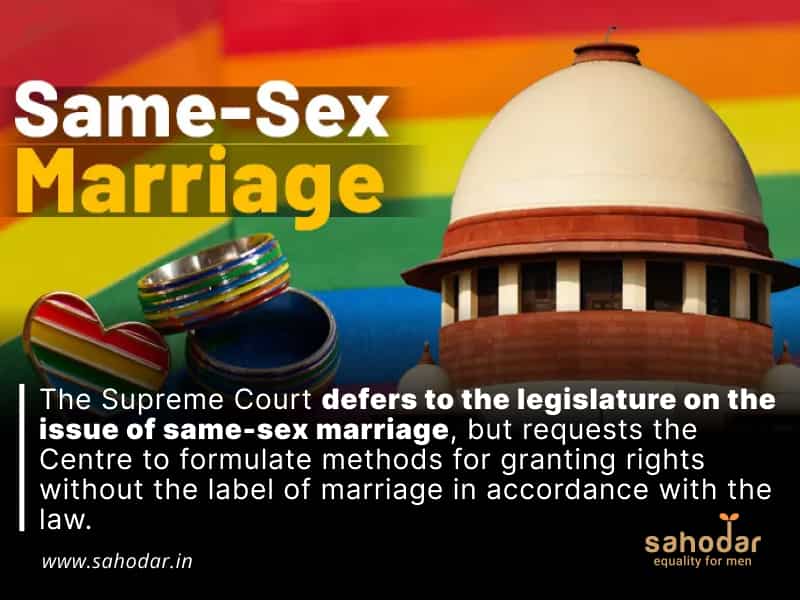Chief Justice of India (CJI) DY Chandrachud said that the government was being pushed to address this issue due to the fact that if the judiciary enters this arena, it would become a legislative issue. During the hearing of the petitions seeking recognition of same-sex marriages, the Constitution bench of the Supreme Court expressed that it is the responsibility of the legislature to decide on granting legal recognition to same-sex marriages. However, the Court’s focus is to ensure that means are devised to provide same-sex couples with social benefits, legal rights, and other advantages, without the label of marriage. This view was echoed by at least three judges during the past two weeks of the hearing. The Chief Justice of India, DY Chandrachud, who heads the bench, clarified that the bench is not primarily concerned with marriage but rather with the right of two individuals of the same sex to live together and be recognized legally.
“Once you recognise there is a right to cohabit.. and it may be symptomatic of a sustained relationship.. and once you say that right to cohabit a fundamental right, then it is the obligation of the state that all social impact of the cohabitation has a legal recognition.. we are not going into marriage at all,” the CJI said.
The statement was made in response to the argument presented by Solicitor General Tushar Mehta, who was representing the Central government. Mehta argued that although same-sex individuals have the fundamental right to live together and choose a partner, they cannot be legally labeled as married.
“Right to love, right to cohabit, right to choose a partner, right to have a sexual orientation is a fundamental right but there is no fundamental right to seek recognition of that relationship as a marriage or in any other name,” the SG said.
Justice PS Narasimha proposed that the recognition granted to same-sex couples does not necessarily have to be in the form of marriage, but rather a type of recognition that grants them specific benefits.
“When we say recognition, it need not be recognition as marriage. It may mean recognition which entitles them to certain benefits. The association of two people need not be equated to marriage,” he said.
Justice S Ravindra Bhat also expressed similar views.
“Not marriage but some label is needed,” he said.
According to CJI Chandrachud, if the judiciary interferes with this issue, it will become a matter for the legislature, which is why the government is being compelled to address it. The CJI asked the government how it intends to address cohabiting relationships and how it will ensure social welfare and a sense of security for those involved. Additionally, the CJI stressed the significance of ensuring that individuals in such relationships are not marginalized.
“Why we are pushing the government is because we understand your point that entering this arena will require legislation. So now what? What does the government want to do with cohabitory relations? And how can a sense of security and social welfare be made to ensure that such relations are not ostracized?” he questioned.
SG Mehta stated that while the Centre can aid in eliminating these challenges, it cannot provide any legal recognition or status of marriage.
“The modality adopted is important since the term used can also be partner.. if not that then it may be counter productive,” Justice Bhat opined.
In response to this, the CJI suggested that the SG could discuss this matter with the appropriate authority and provide a response to the Court during the next hearing, scheduled for May 3.
“We request you to assist us in a non adversarial manner,” the CJI said.
Source: https://www.barandbench.com/news/supreme-court-says-recognising-same-sex-marriage-legislature-asks-centre-devise-means-confer-rights-marriage-label?utm_source=izooto&utm_medium=push-notification

